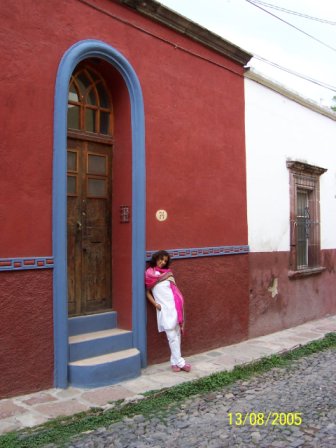Last night was a Wednesday night in Washington DC. It was also the first warm night of the year. I was headed to the Science Club—a lovely club off of M street---to sing at an Indian open microphone event. My office mate, an accomplished tabla player, had put me in touch with a group of people who were bringing together artists and aspiring artists of Indian origin in the DC area and this was our first event. I was so excited. For a person who sings Indian music, and that too classical and semi-classical music from North India, it is rare to have the opportunity to share it.
The experience turned out to be something far beyond what I could have imagined. Barring a couple of acts, the open-microphone was basically a forum for presenting poetry, comedy and music that vented many different types of confusions: Who am I? What do I do if “I am too white to be black and too black to be white”? Arranged marriages “suck”. People who my sister is meeting through the arranged marriage circuit are “losers”, “liars” and “child molesters”. India is what you see in Bollywood. Bollywood is basically porn. That explains why you see so many people when you go to India. What does my white boyfriend think of me? What do I think of my white boyfriend? “My people” and “his people”. How do we get along?
Somewhere in the middle of all this, I sang a meera bhajan. My music stuck out like a sore thumb because it was Indian. Meera bai was a queen from Rajasthan who lived around 1500 AD and was widely known all over India for her devotion to Lord Krishna. Her longing to unite with Lord Krishna ultimately led her to renounce the world and wander around Rajasthan, preaching of his powers, and gaining followers. The bhajan I sang was composed in a classical raga (Shankara). I think it went over okay: people whistled and clapped and applauded. But…. I know that I could have just as well sung in Swahili. Nobody there had any understanding of the music, or the history, geography or culture that generated it. It was “kinda cool” and I was told that I had a “nice voice”. The words, the history, the Indian bhakti tradition, the ambience of the desert of Rajasthan was utterly and totally lost.
The experience left me rather shaken. To see aspiring Indian artists talking about dual identities in America, and yet not be able to comprehend a basic song from India, left me taken aback. The American side of most of the performers seemed quite complete and quite secure. Their thoughts and experiences of America were truly their own and their opinions about America were grounded in experiences of friends, schools, jobs, careers, and just about every other aspect of life. Their Indian side however, was severely stunted. Opinions on India and Indian culture were basically based on only their interactions to their family and family-friends. Very few people who came to the microphone last night seemed to have any independent experiences in India or of India. Many people at the microphone talked about growing up in suburbs of American cities. For them, India is what their family tells them it is. Any identity issues are not really confusions about what it means to be “Indian Americans”, but rather, what it means to be “American members of that particular family”.
To me, it seems that when a person says that they have a dual cultural identity, they need to have experiences in two cultures. Hanging out with a handful of Indian families in the US and hanging out with family in India once in a few years is not enough of an inroad into another culture. Learning the language, reading literature, studying a country’s history, understanding its cultural evolution, and most important of all, spending time with people who live there who are your own age, and understanding their lives and experiences gives you the authority to talk about India. I was very impressed with one particular person who came to the microphone to talk about violence against women in India. He had spent a year in India working for an NGO in Gujrat. He didn’t need to address issues of identity. In working with the poor and the disadvantaged, he had found more to think about and more to say.
As I drove home from my rather traumatic experience, I arrived at an interesting realization. In my view, those American-born-Indians who truly push themselves to experience modern-day India either by traveling there without family, or volunteering there, or making their own friends there, or by just spending time there, typically do not have confused identities or frustrations. People who don’t do this tend to confuse their family’s culture for a nation’s culture. They have confused identities not because of a clash of cultures, but because of the normal clash of generations that can be found in every family. I would advise every Indian born in America who feels confused to travel to get to know India on their own terms., and find their own India. Else it makes sense to embrace the reality of being American. This country gives all its citizens millions of ways to define themselves that have little to do with India. That road will lead to a better place than the road of trying to find India without knowing India.
